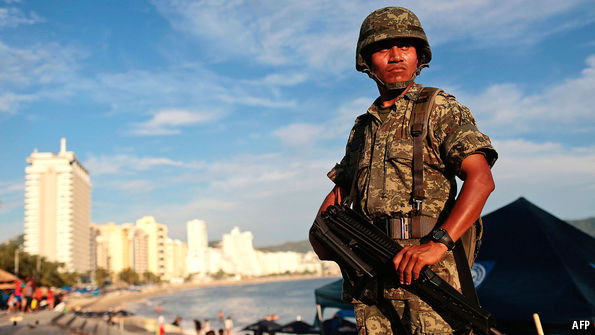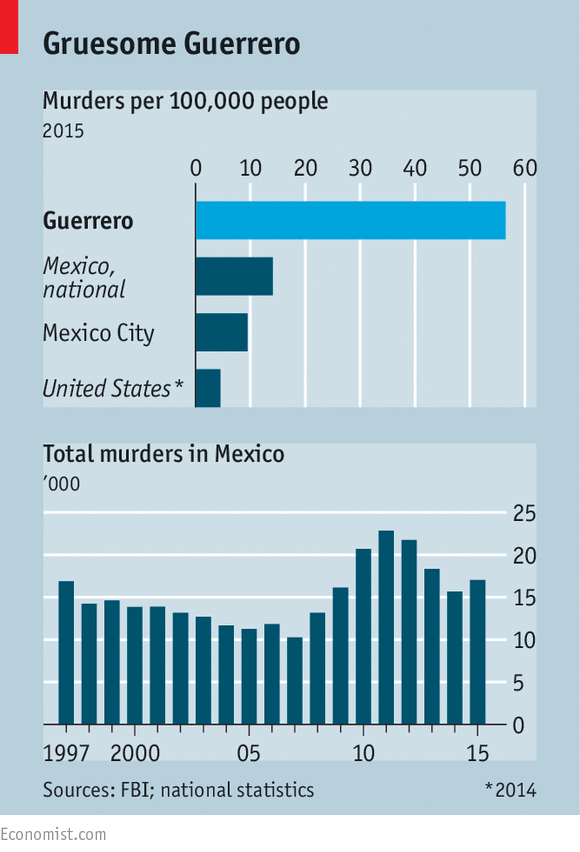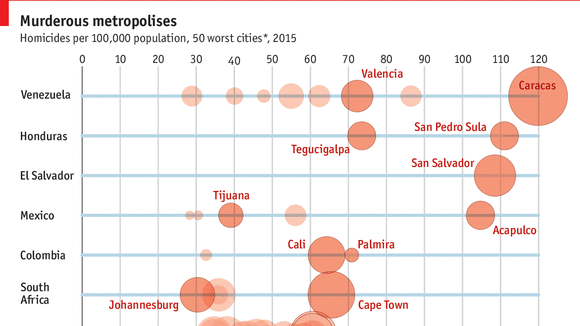After a decline the murder rate is rising. But the president’s crime-fighting plan is making slow progress

A TACO seller points to two spots on Acapulco’s beach where people have been shot dead in recent days. An American on a sunbed recalls having a massage within sight, he later realised, of the body of a murdered vendor. The mayhem in Acapulco, the world’s fourth most violent city, is largely confined to its periphery, but tourists are beginning to notice it. Soldiers patrol the beaches, provoking unease rather than inspiring confidence. A Canadian, who started coming to Acapulco in the 1970s, says he will not be returning.
The bloodshed on the beach does not tell the whole story about crime in Mexico. Many parts of the country are more peaceful than they once were, especially in areas where wars between drug gangs have ended with victory for one side. In Acapulco, in the south-western state of Guerrero, the fight for control of trade in heroin, made from locally grown poppies, is still raging. Some sorts of crime, including kidnapping and extortion, appear to be diminishing.
But after three years of decline the national murder rate jumped in 2015 and has continued to rise this year (see chart). The number of murders in January was 11% higher than during the same month last year. This does not portend a return to the horrific violence of 2010-12; almost 40% of the recent rise is accounted for by gang-infested Guerrero.

Even so, it greatly increases pressure on the president, Enrique Peña Nieto, who promised to “step up the pace” on security in the second half of his term, which runs until 2018. An astonishing 99% of all crimes are never punished, a level of impunity that encourages criminality of all sorts. Mexico came 58th out of 59 countries in a global impunity index published recently by the University of the Americas in Puebla, south-east of Mexico City.
Several recent outrages have piled on the pressure for change. So far this year four journalists have been murdered, one more than in all of 2015; the mayor of Temixco, south of Mexico City, was killed after just a day in office; 49 inmates of Topo Chico prison in the northern state of Nuevo León died in a riot in February. In the state of Veracruz five people vanished after their arrest by state police, an ugly echo of the disappearance in September 2014 of 43 students in Iguala, about 220km (135 miles) inland from Acapulco.
Peña has a plan
Mr Peña’s response to the public revulsion caused by the students’ disappearance was to announce a ten-point anti-crime programme. It is making halting progress. A law that would allow the federal government to take over local administrations infiltrated by organised crime is stalled in Congress, largely because of fears among opposition politicians that the government could abuse its power. Also stuck is a law that would assign a unique ID number to each citizen, making it easier to track those suspected of committing crimes.
Political wrangling is holding up a measure that the president considers vital, a federal law that would subject Mexico’s 1,800 or so local police forces to the control of the 32 state governments, a policy known as mando único (unified command). Like his predecessor, Felipe Calderón, Mr Peña relies on the army and navy to combat serious crime, largely bypassing local police forces. Under mando único state police forces, which are supposedly more competent and effective than local ones, could play a more active role.
Mr Peña’s plan is competing with proposals put forward by opposition parties, one of which would let big towns keep their police forces. Odds are that a federal law will eventually be passed, in part because the interior minister, Miguel Ángel Osorio Chong, is thought to have presidential ambitions. In the meantime mando único is being implemented in piecemeal fashion; more than half the states have introduced a version of it. In Guerrero, just a few towns have agreed so far to let the state government run their police forces.
The policy is not the cure-all the government seems to think it is. State police forces have not been shown to be less corrupt or more effective than municipal ones. Incompetent officers serve at both levels. Four of the seven state policemen arrested in connection with the recent disappearances in Veracruz had failed tests of their fitness for duty.
In Guerrero, mando único could “decontaminate” some of the local police forces that have been infiltrated by organised crime, says Gabino Solano of the state’s Autonomous University. But what Guerrero needs more, he says, is a rigorous federal response to such problems as its weak economy, poor health and education and the lethal competition among drug gangs.
The fragmentation is in part a consequence of the government’s success in hunting down crime bosses. Mr Peña’s administration has so far “neutralised” 99 of the 122 it singled out in 2013. “The government has proved that it can catch capos,” says Alejandro Hope, a security analyst. Now it “needs to show that it can prosecute them and keep them in jail.”
It must also dismantle their organisations. After beheading the gangs the government has failed to seize assets and to arrest the leaders’ closest accomplices, says José Antonio Ortega of Security, Justice and Peace, an anti-crime NGO. Edgardo Buscaglia of Columbia University calls for states to establish “economic investigative units”, which would work with independent prosecutors to find criminal assets such as factories and trucks.
A judicial reform, enacted into law in 2008 and due to be fully implemented by June this year, should make justice fairer. This will replace closed-door criminal proceedings, in which judges render verdicts on the basis of written statements, with oral arguments between prosecutors and defendants’ lawyers. The reform strengthens defendants’ rights, including the presumption of innocence, which is inscribed in the constitution but often ignored in practice. It allows perpetrators of minor crimes to be punished with sentences other than jail time.
If Mr Peña is to entrench the rule of law, corrupt politicians, as well as gun-slinging gangsters, will have to be held to account. His proposal for an “anti-corruption system” of independent watchdog agencies is working its way through Congress. Mr Peña himself has been embarrassed by conflict-of-interest allegations related to the financing of his wife’s house; an investigation cleared him of wrongdoing. If Mexicans are to take seriously their leaders’ crime-fighting credentials, politicians will have to police themselves better.




No comments:
Post a Comment